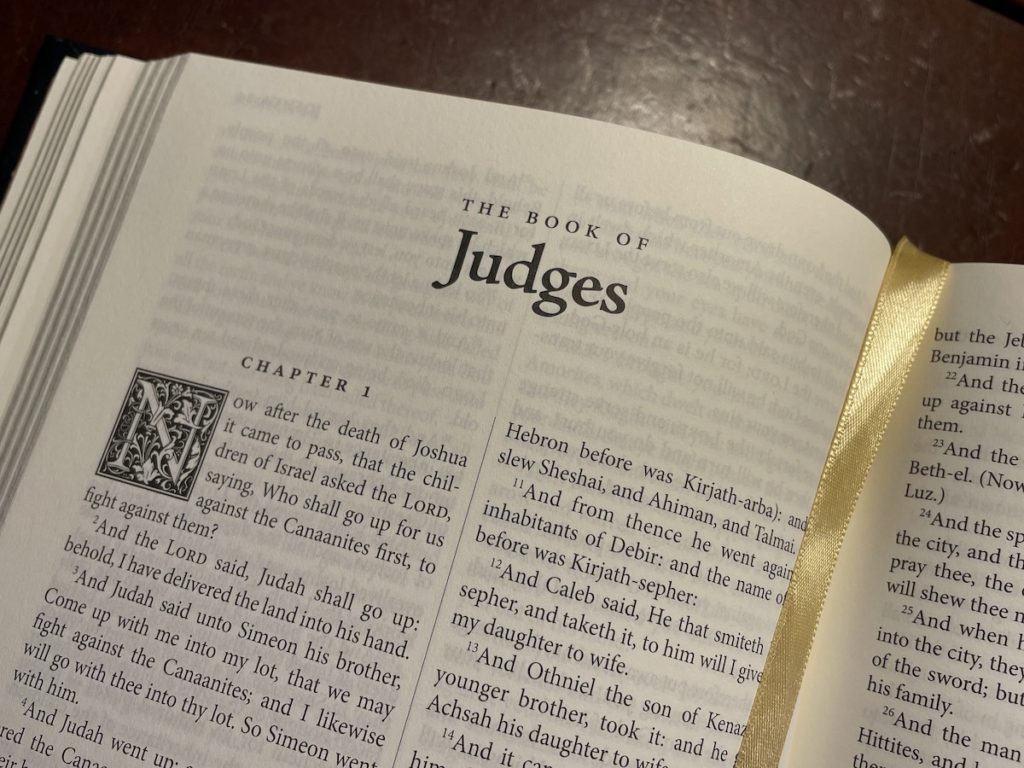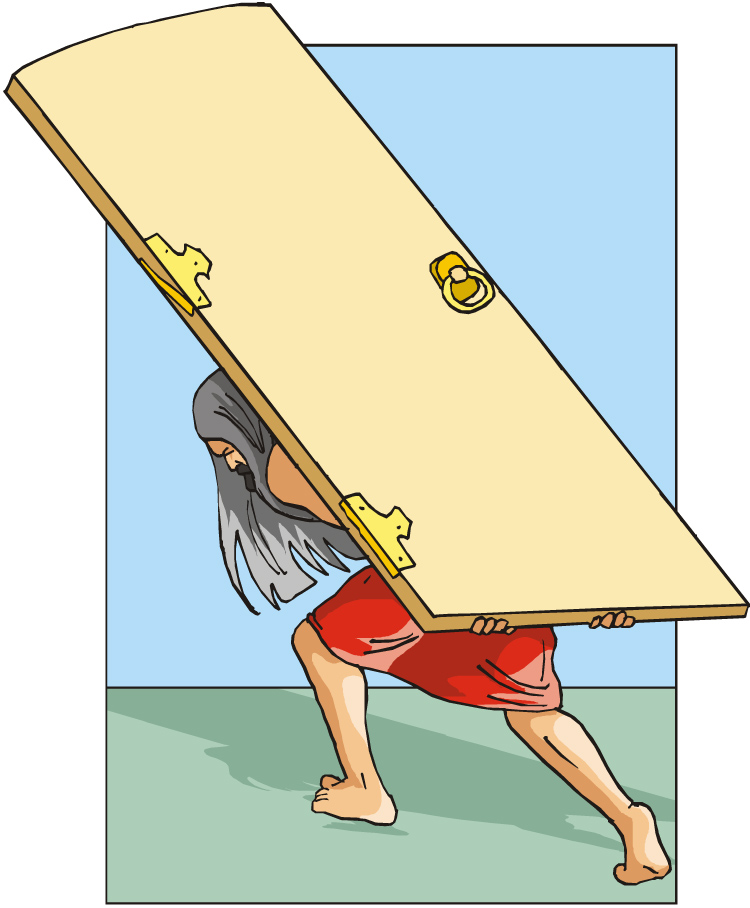
Judges 11
Jephthah—A Man of Faith From “the Other Side of the Tracks”
Judges 11:1–2, Was the son of a harlot. YHVH can raise up anyone to accomplish his purposes—even men of low degree. YHVH does not judge a man by his outward appearances, but by the condition of his heart (1 Sam 16:7). In YHVH’s eyes, what was Jephthah? (See verse 1.) Are there specters from your past that still haunt you and hold you back, or have you overcome them by the blood of the Lamb and assumed your new identity as more than a conqueror who is seated in heavenly places with Yeshua? (Read Phil 4:13; Rom 8:37; Rev 12:11; Col 2:12; Eph 2:6; for your inspiration and edification; also read Zec 4:6 and 1 Cor 1:27.) YHVH can take any vessel, no matter how average it may be, and elevate it for his purposes providing the vessel has faith and willingness to be used. In this way, YHVH and not man gets the glory. Will you be such a vessel in YHVH’s hands?

Judges 11:12, Jephthah sent messengers unto the king. Before going to war with the people of Ammon, Jephthah made every effort to diplomatically resolve Israel’s differences with that hostile nation. Armed conflict was still the result, and YHVH gave Israel the victory.
What can we learn from this? Yeshua instructs us to make every attempt to create peace with our enemies before resorting to legal (or in Jephtha’s case, lethal) means (Matt 5:25–26). When all else fails, if one is walking in the paths of righteousness, know that YHVH will back you when, as a last resort, you come to blows with your enemies.
In Scripture, there exists no prohibition against self defense. Some will use Yeshua’s admonition to turn the other cheek (Matt 5:39) as justification not to defend oneself against an aggressor, and that somehow doing so will be a witness to one’s enemy of the love of Yeshua. Not defending oneself may accomplish this noble goal, but more likely the aggressor will view it as a sign of weakness to justify increased aggression against you and your loved ones.
When Yeshua said to turn the other cheek what did he really mean? Was Yeshua justifying pacifism in place of self defense? According to Hebrew scholars, David Biven and Roy Blizzard, pacifism has never been part of Hebrew thought or culture. It is permissible to kill in order to defend oneself. The authors point out that some of Yeshua’s disciples were armed (Luke 22:38, 50), and that once Yeshua even suggested that his disciples purchase swords (Luke 22:35–37). When instructing his disciples to turn the other cheek, Yeshua was not talking about how to deal with violent aggressors such as rapists, robbers, or murderers, or when facing an enemy in battle. Rather he was talking about the fundamentals of brotherly relationship—how to relate to our neighbors. In other words, if a friend embarrasses us by slapping us in the face, we are not to slap him back, but instead to offer him the other cheek. This has nothing to do with a battlefield situation or when dealing with a violent aggressor. (Understanding the Difficult Words of Jesus, pp. 68–71). In other words, when it comes to offensive words or actions from brother in the faith, we need to let offences simply roll off our back, for love covers a multitude of sin (1 Pet 4:8).
Judges 11:29, Then the Spirit of YHVH came upon Jephthah. There are those who claim that the power and gifts of YHVH’s Spirit were unknown in biblical times prior to the outpouring of the Spirit on the day of Pentecost in Acts chapter two. This is not altogether true when one considers this passage concerning Jephthah. What are some other examples of YHVH’s Spirit coming upon Israelites in the prior to the Pentecost? (See Num 11:26–27; 24:2; Judg 3:10; 6:34; 13:25; 14:6,19; 15:14; 1 Sam 10:11; 11:6; 19:20–24; 1 Chron 12:18; 2 Chron 24:20.)

Judges 11:30–31, For a burnt offering (KJV); or as a burnt offering (NAS, NIV, NKJV); or as an elevation offering (ASET). This doesn’t mean that Jephthah literally made a human sacrifice of his daughter, for this would not only have violated the Torah, but would have been subscribing to the most heinous and vile of heathen practices, that of human sacrifice to their gods. Not only that, the Torah made provisions for one who made a rash and illegal vow. It was considered a sin to so, and atonement could be made for it by making the required sin offering (Lev 5:4–6).
More realistically, Jephthah consecrated his daughter to YHVH for the rest of her life (like a Nazarite) to remain in a virginal state (which is why she bewailed her virginity and Jephthah had no descendants — a terrible price to pay for a rash vow, yet to Jephthah’s credit for keeping his vow to Elohim even to his own hurt —a mark of a righteous man (Ps 15:4; Heb 11:32). Perhaps Yeshua had this incident in mind when he instructed his disciples to not swear an oath at all, but to give one’s word only by saying “yes” and “no” (Matt 5:34–37).
Judges 11:30, Jephthah vowed a vow. Rash words (or vows) spoken may come back to haunt a person. Be careful with the mouth. Proverbs 10:19 says, “In the multitude of words there lacks not sin, but he that refrains his lips is wise.” Not only that, was Jephthah attempting to negotiate with YHVH? If so, was this a wise move? Does YHVH really need or want anything that we could possible give him in order to curry his favor? There is only one thing that he wants from us. What is that? (Read Hos 6:6; 1 Sam 15:22; Mic 6:8; Isa 66:2.) The heart of man is always the issue with YHVH! (See 1 Sam 16:7; 1 Sam 13:14; Acts 13:22.)
Judges 13
The Birth of Samson—A Mighty Man on the Outside, But Weak on the Inside

Ever since the death of Joshua and during the time of the judges the spiritual and moral state of Israel slowly declined until the time of Samson. As The ArtScroll Rubin Edition Joshua/Judges Commentary points out, Samson was a new kind of judge. “Up to this point, Israel’s sins would lead to foreign domination, followed by repentance and the emergence of a judge who would lead the people to defeat and expel the enemy. In this new period, the people’s descent was so serious that they did not merit a complete salvation of the sort that had been achieved by such judges as Deborah and Gideon.” Nevertheless, it was not in YHVH’s overall plan to let Israel’s enemies go completely unchecked so that the sublimation and eventual destruction of Israel would be complete. He used Samson to check the Philistines’ quest to totally subjugate the nation of Israel and to punish the former, while at the same time YHVH extended grace to Israel by relieving them of some pressure from their enemies (p. 195).
Continue reading
